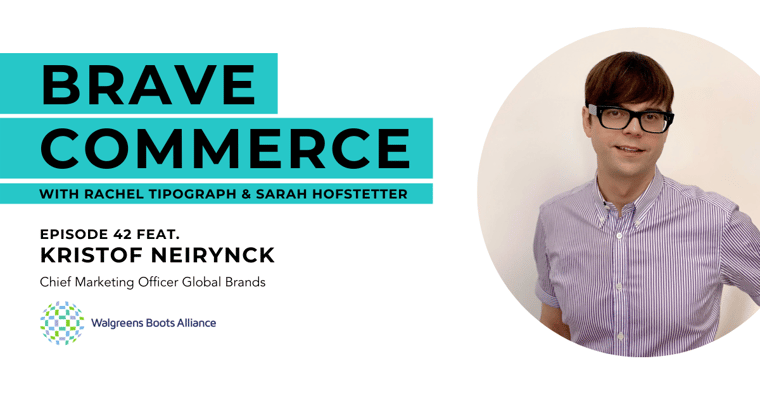
Walgreens Boots Alliance is the parent company of many brands and retailers in the pharmaceuticals and beauty sector. As such, the company has a unique perspective of what it means to provide a shopping experience for the consumer. On this episode of BRAVE COMMERCE, hosts Rachel Tipograph (Founder & CEO of MikMak) and Sarah Hofstetter (President of Profitero) sit down with Kristof Neirynck, the Chief Marketing Officer of Walgreens Boots Alliance, to discuss how to balance both retailer and brand interests, treading the line between privacy and personalization, and the bravery in standing up to racism.
Using consumer preference to balance retailer and brand interests
“Every year or every quarter,” Kristof shares, “[internal brands] need to pitch like [external brands] would for our space in the store.” These guidelines used consumer preference to keep both the brand and the retailer competitive. If internal brands are not selling, they are also subject to removal from the shelf. Stores ”need to provide customers with choice” so that they keep returning to shop, and thus would “never just [run their] own brands.” The rules of engagement also required clear firewalls around each business, to the point where brands and retailers are physically separated in different locations.
However, having both retailer and brand level data provides more dimension for strategy. Kristof gives the example of positioning their internal brand, No7, in the UK versus the US. It’s all about answering “where does the consumer go to shop beauty?” he says. In the UK, No7 ranks as the “number one beauty brand in the markets” and Boots has a significant share of the beauty market. Stocking No7 exclusively at Boots, thus, creates a “win-win scenario” for their business. The retailer wins by having increased foot traffic due to No7, and the brand receives the added bonus of more retailer support. However, in the US, Walgreens only has about ten percent market share in beauty. Thus, it made more sense to make No7 available more broadly to Ulta, Target, and Walmart. “That's where the consumers go to shop for the products,” Kristof replies.
The line between privacy and personalization
Providing a strong personalized consumer experience requires knowing what the consumer wants, and gathering that data has become complex given the shift toward more regulations around data privacy. Here, too, consumer expectation plays an important role. At the end of the day, regardless of regulations, a consumer responds well to your brand’s personalized shopping experiences if it is what they are expecting. When consumers find your level of personalization “a little bit creepy,” Kristof notes, “you probably are not in the right zone.”
Being global retailers with global brands comes with unique access to rich sources of first-party data. “We can actually see what consumers are actually doing,” Kristof says, ”We can see trends already in the purchases or the searches on our websites,” and that gives signals that “help us develop the right product portfolio.”
There’s also the opportunity for ePharmacies to deliver a holistic healthcare experience via Walgreens app, Find Care. Here, consumers can report their symptoms and receive product recommendations, and even diagnostics. This allows the pharmacy to not just answer what medications are being taken, but “why are people taking those medications.” “We're building it out as a true experience platform,” Kristof says, “I think that's where personalization is not creepy because people are actually coming to you for advice, and I think that's where we can add a lot of value as a retailer and go beyond just selling a few products to becoming that healthcare hub and that healthcare destination.”
Standing up against systematic discrimination
Kristof recalls his bravest moments as the times when he refused to be complicit in a procedure that he found to be systematically racist. When he was 18 years old, Kristof worked the night trains between Brussels and other major cities. At the time, there were still border controls at the Swiss border, and part of Kristof’s role was to gather passports and present them to border officials.
To Kristof’s surprise, border officials would come onto the train and explicitly ask if there were any Black or Algerian passengers. “There was an expectation that you, as a guard on that train, would just present the passports to them and they would just check those, because they were too lazy to check all of them,” he explains. Even Kristof’s boss confirmed that this was the usual procedure, warning him that he would get into trouble if he refused to comply. But Kristof stood his ground. “Every time we crossed the Swiss border in the middle of the night,” he says, “they would come in heavily armed, asking the same question all the time. And I would say, ‘No, here's all the passports, help yourself.’”
He emphasizes that this bravery is still “needed more than ever” around the world today. “We all need to become active and anti-racists rather than just ignore it. Because I could have just ignored it, no problem. We all need to stand up more and more.”
Ready to become BRAVE together? Subscribe today!


